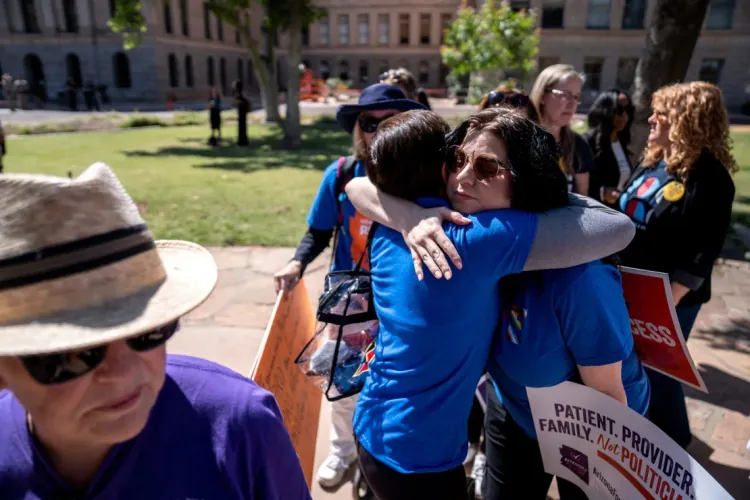Arizona Supreme Court Enforces 160-Year-Old Abortion Law: A Deep Dive
The Arizona Supreme Court's decision to enforce a century-old abortion law, its implications, and reactions

-
Introduction
- Overview of the Arizona Supreme Court ruling on the century-old abortion law.
- The socio-political context of the decision.
-
Historical Background of Arizona's Abortion Law
- Origins of the 160-year-old law.
- Comparison with other states' abortion laws.
-
The Supreme Court's Ruling
- Details of the ruling.
- Immediate effects on abortion providers and recipients.
-
Reactions to the Ruling
- Statements from Arizona Attorney General Kris Mayes and other officials.
- Public and political reactions.
-
Legal and Social Implications
- Impact on healthcare providers and patients.
- The broader implications for reproductive rights in the U.S.
-
Future Prospects
- Upcoming legal challenges and political actions.
- The role of voters in determining the future of abortion rights in Arizona.
-
FAQs
- Common questions about the ruling and its effects.
-
Conclusion
- Summary of the situation.
- Encouragement to follow developments and engage in the democratic process.
Introduction
In a landmark decision that resonates through the corridors of time, the Arizona Supreme Court has upheld a law dating back 160 years, effectively banning nearly all abortions except when necessary to save the life of the pregnant person. This ruling places Arizona among the states with the most stringent abortion laws, sparking a fervent dialogue on reproductive rights and legal precedents.
Historical Background of Arizona's Abortion Law
The contentious law, rooted in the Civil War era, predates Arizona's statehood and carries severe penalties for abortion providers. Its resurrection follows the U.S. Supreme Court's overturning of Roe v. Wade, signaling a seismic shift in the landscape of reproductive rights.
The Supreme Court's Ruling
The court's decision has been met with a mix of dismay and determination. While it puts providers and patients in a precarious position, it also opens the door for further legal challenges and discussions about constitutional rights and state laws.
Reactions to the Ruling
Arizona Attorney General Kris Mayes has emphatically stated that under her watch, no woman or doctor will be prosecuted under this law, highlighting the tension between state mandates and individual officials' stances. The public and political reactions have been intensely polarized, reflecting the broader national debate on abortion.
Legal and Social Implications
The ruling's implications extend beyond the immediate legal consequences, affecting healthcare providers' ability to offer care and patients' access to necessary medical procedures. It also stirs a broader conversation on the role of historical laws in contemporary society and the ongoing struggle for reproductive rights.
Future Prospects
As the dust settles, the focus shifts to future legal battles and the potential for voters to have the final say through ballot measures. This dynamic underscores the ever-evolving nature of the fight for reproductive rights and the crucial role of public engagement and advocacy.
FAQs
Q: What does the Arizona Supreme Court ruling entail?
A: It enforces a 160-year-old law that bans nearly all abortions, except in life-saving situations.
Q: How does this affect abortion access in Arizona?
A: It significantly restricts access, allowing abortions only when the pregnant person's life is at risk.
Q: Can this decision be challenged?
A: Yes, further legal challenges and political actions are anticipated, including a potential ballot measure to enshrine abortion rights in the state constitution.
Conclusion
The Arizona Supreme Court's decision marks a pivotal moment in the ongoing debate over abortion rights, drawing a line that connects the past to the present and future. As we witness the unfolding of these events, it becomes increasingly vital for individuals to stay informed, engaged, and active in the democratic process to shape the laws that govern our lives and bodies.
What's Your Reaction?





















